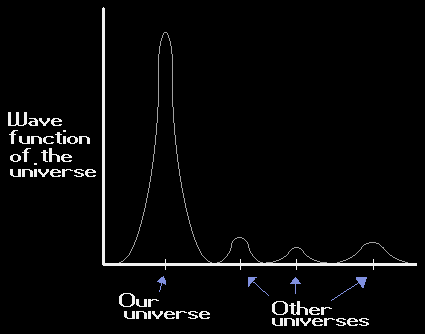[Physicist Stephen] Hawking is one of the founders of a new scientific discipline called quantum cosmology. At first, this seems like a contradiction in terms. The word quantum applies to the infinitesimally small world of quarks and neutrinos, while cosmology signifies the almost limitless expanse of outer space. However, Hawking and others now believe that the ultimate questions of cosmology can be answered only by quantum theory. Hawking takes quantum cosmology to its ultimate conclusion, allowing the existence of infinite numbers of parallel universes.
The starting point of quantum theory ... is a wave function that describes all the possible various possible states of a particle. For example, imagine a large, irregular thundercloud that fills up the sky. The darker the thundercloud, the greater the concentration of water vapor and dust at that point. Thus by simply looking at a thundercloud, we can rapidly estimate the probability of finding large concentrations of water and dust in certain parts of the sky.
The thundercloud may be compared to a single electron's wave function. Like a thundercloud, it fills up all space. Likewise, the greater its value at a point, the greater the probability of finding the electron there. Similarly, wave functions can be associated with large objects, like people. As I sit in my chair in Princeton, I know that I have a Schroedinger probability wave function. If I could somehow see my own wave function, it would resemble a cloud very much in the shape of my body. However, some of the cloud would spread out all over space, out to Mars and even beyond the solar system, although it would be vanishingly small there. This means that there is a very large likelihood that I am, in fact, sitting here in my chair and not on the planet Mars. Although part of my wave function has spread even beyond the Milky Way galaxy, there is only an infinitesimal chance that I am sitting in another galaxy.
Hawking's new idea was to treat the entire universe as though it were a quantum particle. By repeating some simple steps, we are led to some eye-opening conclusions.
We begin with a wave function describing the set of all possible universes. This means that the starting point of Hawking's theory must be an infinite set of parallel universes, the wave function of the universe. Hawking's rather simple analysis, replacing the word particle with universe, has led to a conceptual revolution in our thinking about cosmology.
According to this picture, the wave function of the universe spreads out over all possible universes. The wave function is assumed to be quite large near our own universe, so there is a good chance that our universe is the correct one, as we expect. However, the wave functon spreads out over all other universes, even those that are lifeless and incompatible with the familiar laws of physics. Since the wave function is supposedly vanishingly small for these other universes, we do not expect that our universe will make a quantum leap to them in the near future.
The goal facing quantum cosmologists is to verify this conjecture mathematically, to show that the wave function of the universe is large for our present universe and vanishingly small for other universes. This would then prove that our familiar universe is in some sense unique and also stable. (At present, quantum cosmologists are unable to solve this important problem.)
If we take Hawking seriously, it means that we must begin our analysis with an infinite number of all possible universes, coexisting with one another. To put it bluntly, the definition of the word universe is no longer "all that exists." It now means "all that can exist." For example, in Figure 12.1 we see how the wave function of the universe can spread out over several possible universes, with our universe being the most likely one but certanly not the only one. Hawking's quantum cosmology also assumes that the wave function of the universe allows these universes to collide. Wormholes can develop and link these universes. However, these wormholes are not like the ones ... which connect different parts of three-dimensional space with itself - these wormholes connect different universes with one another.
Figure 12.1

In Hawking's wave function of the universe, the wave function
is most likely concentrated around our own universe. We live in
our universe because it is the most likely, with the largest
probability. However, there is a small but non-vanishing
probability that the wave function prefers neighboring, parallel
universes. Thus transitions between universes may be possible
(although with very low probability).
Think, for example, of a large collection of soap bubbles, suspended in the air. Normally each soap bubble is like a universe unto itself, except that periodically it bumps into another bubble, forming a larger one, or splits into two smaller bubbles. The difference is that each soap bubble is now an entire ten-dimensional universe. Since space and time can exist only on each bubble, there is no such thing as space and time between the bubbles. Each universe has its own self-contained "time." It is meaningless to say that time passes at the same rate in all these universes. (We should, however, stress that (1) travel between these universes is not open to us because of our primitive technological level ... and (2) large quantum transitions on this scale are extremely rare, probably much larger than the lifetime of our universe.) Most of these universes are dead universes, devoid of any life. On these universes, the laws of physics were different, and hence the physical conditions that made life possble were not satisfied. Perhaps, among the billions of parallel universes, only one (ours) had the right set of physical laws to allow life.
Hawking's "baby universe" theory, although not a practical method of transportation, certainly raises philosophical and perhaps even religious questions.
